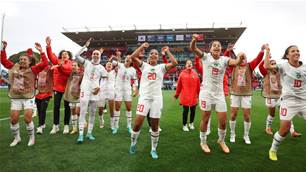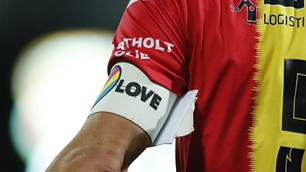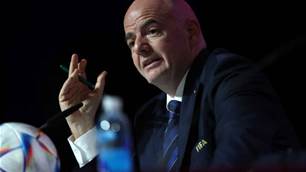Former referee John Underhill has welcomed the world governing body's decision to open an inquiry into the possible use of extra match officials or technology.
FIFA yesterday ruled out the possibility of extending the five-referee system used in this season's Europa League to the 2010 World Cup, but did acknowledge methods of officiating need to improve.
President Sepp Blatter admitted the referee "is not any longer consistent with the quality and the speed of the game" and revealed the use of additional assistants or video replays will be considered by various committees.
Underhill, who refereed in the Scottish Premier League as well as at lower levels in England and Wales, is not surprised FIFA chose not to bring in new measures for the World Cup, but is an advocate of both ideas.
He said: "Perhaps the World Cup is a little too far too fast, but I think the five referees is an experiment worth taking further.
"The more eyes you have got the more likely you are to pick things up.
"There is no reason to think it would not work well - it has in the Europa League - but they are still evaluating the results.
"Having the extra capability to pick things up in and around the six-yard box and the area has to be advantageous. It is about getting key decisions right in important games in a timely fashion.
"In recent years the game has speeded up and there are many more cameras and camera angles.
"Having trained pairs of eyes seeing the incidents from different angles and, more importantly, coming to the correct decisions, is essential when so much is at stake."
Underhill has long felt technology should be used to help referees at the top level.
Until now FIFA have always resisted calls to consider implementing measures now common in other sports such as American football, rugby and cricket.
That could now change and Underhill, who has personal experience of using technological aids whilst refereeing in a Masters event, feels it could work well.
He said: "In the UK Masters final this year I deployed video technology to identify whether there had been a handball at one end.
"The first time the ball went out of play when I could use the technology was actually after a goal being scored at the other end.
"I was faced with a situation on whether it was 4-2 to the team that had got the ball in the net or 2-3 with a penalty at the other end.
"It appeared messy at first but the amazing thing for me was that it only took 30 seconds or so to decide there had been a handball, and long after the decision was made everybody saw it as a useful and usable technique.
"I would like to see the opportunity for certain decisions like handball, whether it is on the line or not, whether it is a goalscoring opportunity or ones that materially affect the outcome of a game, to be looked at.
"With the amount of money and pressure involved in the game, the more aids the referee has without hindering his performance the better.
"I would always have been happy to seek help and advice and weigh up all the data before making a decisions."
President Sepp Blatter admitted the referee "is not any longer consistent with the quality and the speed of the game" and revealed the use of additional assistants or video replays will be considered by various committees.
Underhill, who refereed in the Scottish Premier League as well as at lower levels in England and Wales, is not surprised FIFA chose not to bring in new measures for the World Cup, but is an advocate of both ideas.
He said: "Perhaps the World Cup is a little too far too fast, but I think the five referees is an experiment worth taking further.
"The more eyes you have got the more likely you are to pick things up.
"There is no reason to think it would not work well - it has in the Europa League - but they are still evaluating the results.
"Having the extra capability to pick things up in and around the six-yard box and the area has to be advantageous. It is about getting key decisions right in important games in a timely fashion.
"In recent years the game has speeded up and there are many more cameras and camera angles.
"Having trained pairs of eyes seeing the incidents from different angles and, more importantly, coming to the correct decisions, is essential when so much is at stake."
Underhill has long felt technology should be used to help referees at the top level.
Until now FIFA have always resisted calls to consider implementing measures now common in other sports such as American football, rugby and cricket.
That could now change and Underhill, who has personal experience of using technological aids whilst refereeing in a Masters event, feels it could work well.
He said: "In the UK Masters final this year I deployed video technology to identify whether there had been a handball at one end.
"The first time the ball went out of play when I could use the technology was actually after a goal being scored at the other end.
"I was faced with a situation on whether it was 4-2 to the team that had got the ball in the net or 2-3 with a penalty at the other end.
"It appeared messy at first but the amazing thing for me was that it only took 30 seconds or so to decide there had been a handball, and long after the decision was made everybody saw it as a useful and usable technique.
"I would like to see the opportunity for certain decisions like handball, whether it is on the line or not, whether it is a goalscoring opportunity or ones that materially affect the outcome of a game, to be looked at.
"With the amount of money and pressure involved in the game, the more aids the referee has without hindering his performance the better.
"I would always have been happy to seek help and advice and weigh up all the data before making a decisions."
Copyright (c) Press Association
Related Articles

Morocco blazing a trail for Arab women's football participation

FIFA blasted for OneLove armband threat













